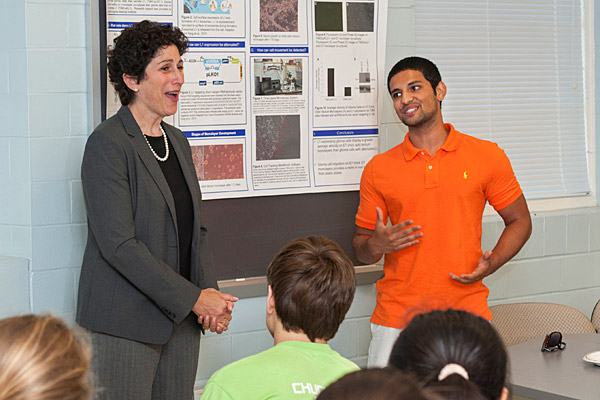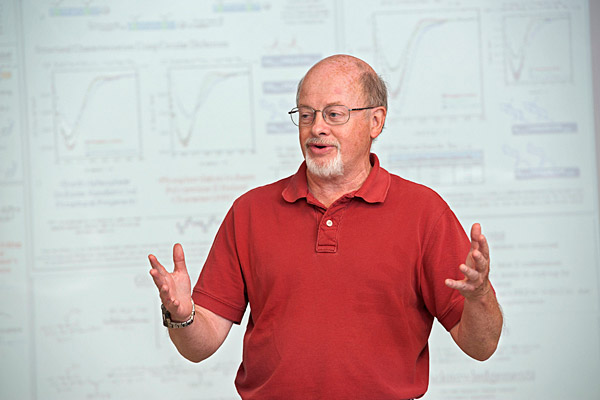


Poster prep
Undergraduate researchers learn professional presentation skills
11:32 a.m., July 30, 2012--Those attending academic conferences often encounter row upon row of posters summarizing the work of numerous scientists in a variety of fields, each with an eager researcher standing by to elaborate on the information.
"No one has time to look at them all," Harold (Hal) White, professor of chemistry and biochemistry, told UD students at a July 25 workshop on campus. "You have to come up with a poster that gets their attention."
Research Stories
Chronic wounds
Prof. Heck's legacy
White, who also is director of the Howard Hughes Medical Institute Undergraduate Science Education Program at UD, and David Usher, professor of biological sciences and assistant director of the science education program, organized the workshop for undergraduates conducting scientific research this summer. It was part of a nine-week enrichment program designed to help the students as they prepare for careers, graduate studies or other educational endeavors.
Students who took part in the workshop will be putting what they learned into practice very soon. They will be among more than 300 students expected to attend UD's third annual Undergraduate Research and Service Celebratory Symposium on Aug. 9, where research scholars will summarize their summer work via posters and in talks.
"People coming to see your poster are going to be interested, and you have to be able to explain it," Usher told the students, referring not only to the Aug. 9 event but also to national professional conferences. "The whole point of a poster is to talk to people in your field who are interested in your work. That's called networking."
In addition to providing tips on designing an effective poster, the workshop featured guidance on oral presentations. Barbara Garland, a communication consultant, told students that speaking in a way that engages the listener is a useful skill for life, not just for research conferences.
"Know your audience and adapt your language to be accessible," Garland said. "Use your own communication style. Find your voice so you can communicate effectively with a broader audience."
Two experienced UD undergraduate researchers assisted Garland by demonstrating mistakes that are commonly made in public speaking, including the overuse of jargon, reading from a poster rather than elaborating on it, speaking too quickly and not looking at the listener. The students then presented a revised version of their talks, correcting the previous mistakes and adding such elements as everyday analogies and examples to engage an audience and clearly show the significance of their research.
If a presentation is very technical, Garland said, "A listener might think, 'I should be more knowledgeable about this subject.' But that's not the listener's job; it's the presenter's job to make it accessible."
After the workshop, Nick Lombardi, a biological sciences major who has been conducting undergraduate research this summer, said he had previously heard some of the advice given in the workshop but appreciated the timely guidance and helpful new information.
"It always helps to hear updates and opinions and to see examples firsthand," he said. "Public speaking, especially, isn't something that comes naturally to a lot of people, so it's good to be prepared."
Article by Ann Manser
Photos by Evan Krape









